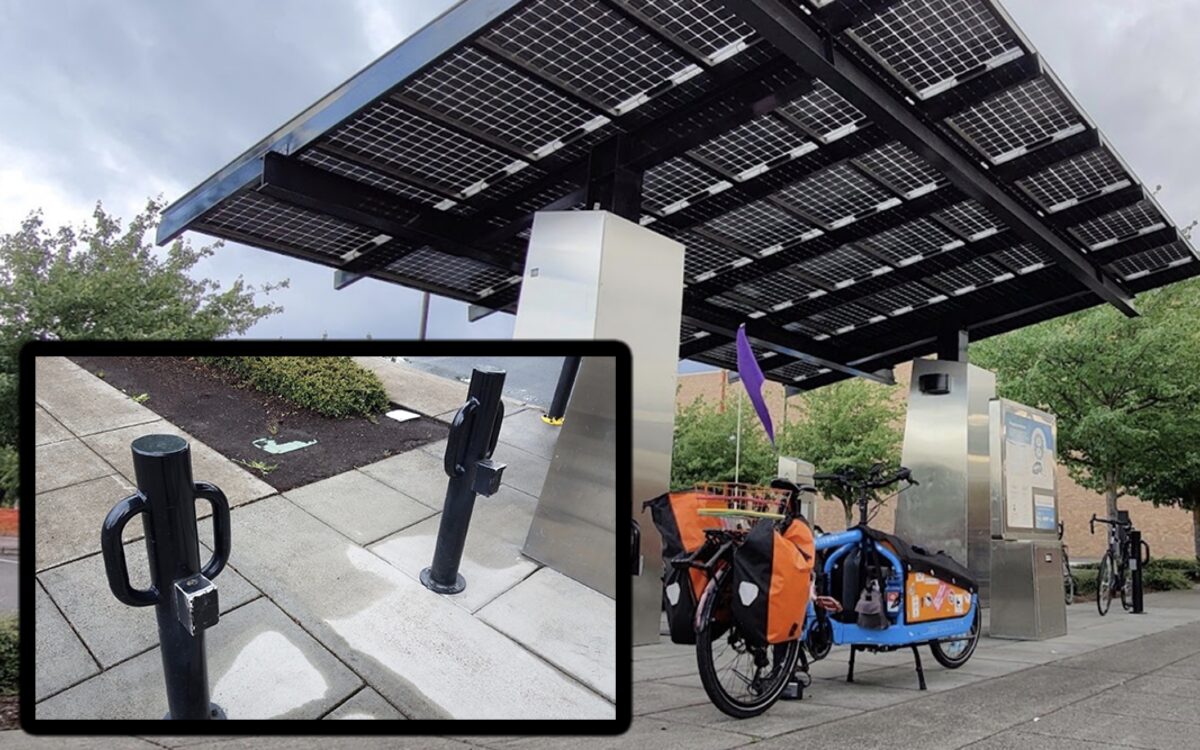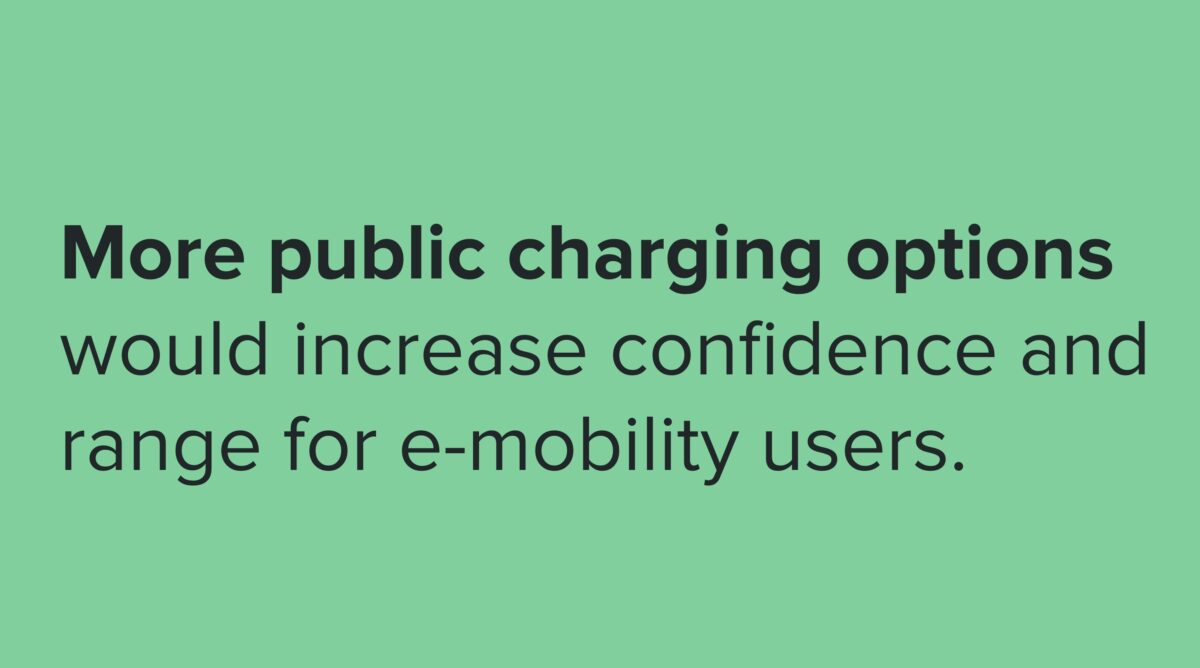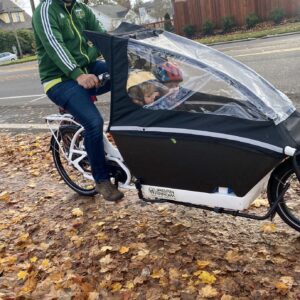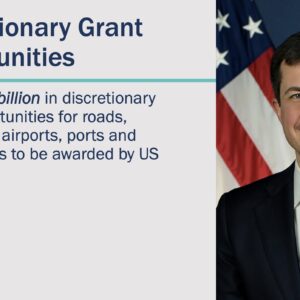
(Photos of bike charging station at OMSI by Shawne Martinez)
We know funding is coming for electric vehicles. Will Oregon put it all toward cars — even though there’s a growing awareness that electric cars won’t save us? Or will electric bikes and other smaller EVs get the investment they deserve?
Since the highly-anticipated, $1.2 trillion Biden Infrastructure Package finally passed last month, Oregonians have been wondering how we’ll spend our share. The State of Oregon will be getting an infusion of about $1.2 billion in federal funds over the next five years, and the Oregon Department of Transportation (ODOT) has already kicked off a process to prioritize investments.
Oregon’s climate action policy puts a big emphasis on an expansion of electric vehicle use and ODOT announced this week they’ll use $52 million to install EV charging infrastructure. This money will be particularly focused on the “Alternative Fuel Coordinators” of Interstates 5, 84 and 82, and U.S. 26, 101, 20 and 97. When it comes to conversations around electrifying the transportation grid, there’s a risk that we pay too much attention to cars and leave e-bikes in the dust.
Advertisement
BikePortland has previously reported on Oregon’s Transportation Electrification Infrastructure Needs Analysis (TEINA), an assessment of Oregon’s EV charging needs. This report left a gap when it came to electric bicycles, and since e-bike riders say they often fear losing power without a place to plug-in, e-bike charging is a crucial area to focus on.

(Photo: Jonathan Maus/BikePortland)
One advocate of e-bike charging infrastructure is Shawne Martinez, a southwest Portland resident who has logged 7,500 miles on his family cargo bike in less than two years. Martinez is a volunteer with Bike Loud PDX and he recently completed the vaunted Traffic and Transportation Class at Portland State University. Martinez chose the issue of e-bike charging for his final project in order to highlight how the vast potential of e-bikes will be tamped down unless we can alleviate range anxiety and provide reliable public bike charging.
That’s why we were very happy to see a mention of e-bikes in ODOT’s recent announcement. They cited surging e-bike demand and even linked to a New York Times article on the subject.
If you want to make sure ODOT pay attention to e-bikes, scooters, EUCs (electric unicycles), e-boards, and other forms of non-car EVs, you should provide input to the ODOT Climate Office and the Oregon Transportation Commission as they decide how the federal money will be spent. You can email the Climate Office at Climate.Office@odot.state.or.us and submit comments to the OTC here.











Thanks for reading.
BikePortland has served this community with independent community journalism since 2005. We rely on subscriptions from readers like you to survive. Your financial support is vital in keeping this valuable resource alive and well.
Please subscribe today to strengthen and expand our work.
This is all just performative BS just like the 2030 bike plan. Oregon utterly failed to meet its 2020 EV goals and is posed for even more pathological misses in coming years.
The problem is not that “electric cars will not save us” but that this climate science-denying society is not even making a serious attempt to electrify monstrous SUVs/trucks (the term “car” is pro-SUV propaganda), freight, or transit.
About all that federal money? Don’t plan for it. The repubs said they will “re-evaluate” Biden’s infrastructure spending when they take back Congress next year.
I’ve done a lot of reading about this lately, and it’s really shifted my thinking. The biggest emitters in transportation are a fairly small number of vehicles, mostly diesel trucks, diesel trains, and diesel buses. Because these vehicle might drive 100,000 miles a year rather than 10,000 miles. Then there are something like 10% of “cars” (like you say, actually SUVs and light trucks) that similarly drive massive distances per year because they’re traveling around the country for commercial reasons. If we re really serious about tackling the transportation element of climate change, the best thing would be to stop worrying about the average commuter and instead focused on these “super-emitters.” So in a way, neither electric cars nor electric bikes will “save us.” It’s electric trucks, trains, and buses that will. And it’s much easier to convert entire company or agency fleets than to convince individual consumers.
I will say that I love love love my e-bike and would love for there to be a big push to expand them and expand charging infrastructure. But I see that as more of a thing that’s broadly beneficial for livability and health and efficient use of roadways, rather than it being such a climate-focused thing. The big wins are found elsewhere.
If active transportation activists actually supported electrification (as opposed to divisive bike-centrism) they would 1) aggressively lobby for inclusive e-mobility (not just bikes), 2) aggressively lobby for mandated transitions to EVs with weight and size reductions, and 3) demand rapid electrification of transit (including trolley buses, which are far more sustainable than battery operated buses).
There is absolutely no reason a low-occupancy automobile has to weigh more than a 1000 lb and they could weigh as little as a few hundred lbs if we switched from CO2e-intensive metal to composites*.
*bikes should switch to composites, which can literally be made from air.
soren,
Why is it so important to you to maintain these false, broad-brush labels around what you think “active transportation activists” do or care about? As if there isn’t a huge range of different people with different ideas working on different things. “Divisive bike centrism”?
I am referring to “EVs won’t save use but e-bikes will” subcultural dogmatism. The math is clear: electrification of freight, SUVS/light trucks (not cars), and transit are essential in Oregon/Portland and e-bikes* will have negligible impact even if they cause mode share in Portland to increase 5-fold by 2030 (it won’t).
*Do I wish I lived in a society where they could make a difference … of course. This wish; however, does not change Oregon/Portland’s decarbonization math over the next ~8 years.
*mopeds
This is ablest, exclusionary take should get out of here.
I don’t know about you, but I’d much rather ride next to someone hauling their kids on an e-bike than inside a giant SUV, so why the negativity?
What exactly is that pool noodle rack thing on the back of Shawne’s bike?